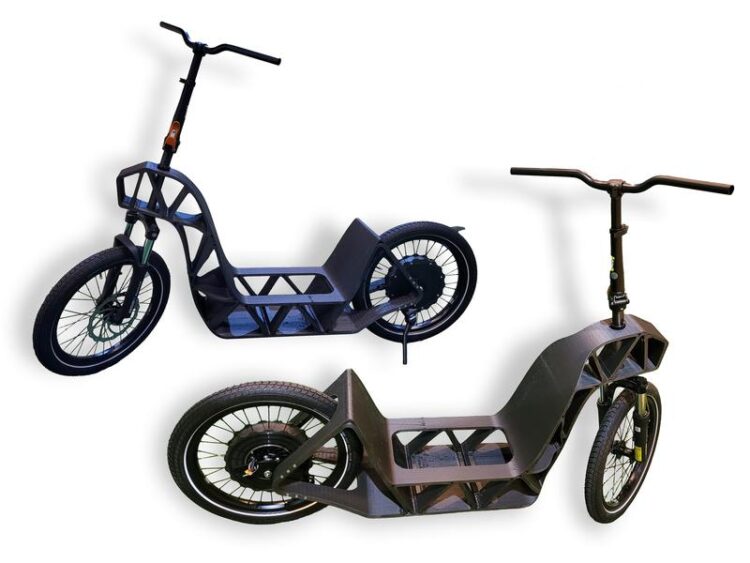Load-bearing plastic structures from the 3D printer

DynaLight Project: Load-bearing frame construction for the electric cargo scooter from the 3D printer
(c) Fraunhofer IWU
Screw Extention Additive Manufacturing (SEAM) makes it possible.
With granulate-based plastic processes, it is now possible to design highly durable products and produce them economically, even in closed material cycles. Fraunhofer IWU demonstrates with a highly resilient shelf and a vehicle frame how individual shaping, low material costs, and high load-bearing capacity can add up to rather useful products (Formnext, November 7 – 11, 2023, Fraunhofer joint booth Hall 11 Stand D31).
3D-printed plastic shelves for battery electric police vehicles: Maximizing carrying capacity
Battery electric vehicles significantly reduce CO2 emissions in the transportation sector. However, the added weight of high-voltage storage systems comes at the expense of allowable payload unless lightweight solutions can be found elsewhere. Fraunhofer IWU and MOSOLF Special Vehicles GmbH suggest a smart solution for simultaneously reducing weight while optimizing cargo space: a 3D-printed rear shelf. Using the Mercedes Vito as an example, the shelf and its fittings can save 26.5 kilograms compared to the previous retrofit solution.

The comparison with the standard shelf (installed) demonstrates the optimized space utilization of the 3D-printed model. (c) MOSOLF Special Vehicles GmbH
The payload capacity of the shelf system remains fully unchanged. The lower drawer in the new shelf can bear up to 100 kilograms. The system’s durability and flexibility are crucial requirements as the equipment for police use becomes increasingly heavy. Ballistic shields, for example, add considerable weight. Nevertheless, the new shelf must provide flexible transportation for traffic control, patrol duties, or police personnel transport at large-scale operations. The newly developed shelf seamlessly fits the vehicle’s exterior, requiring no additional reinforcements or attachments, thus optimizing the cargo space in the rear. The new upper compartments offer even more storage space, thanks to an 8 percent enlarged storage area. Naturally, the shelf is as safe as the standard retrofit version.
DynaLight: 3D-printed plastic frame for cargo scooters
Electrically powered cargo scooters will play a crucial role in emissions-free short-distance transportation in the future. Saving vehicle weight means more payload capacity. However, safety should not suffer at the hands of weight optimization. The designers of the Innvelo Cargo-Scooter from the Chemnitz research institution ICM first banked on a steel frame. The partners in the DynaLight project now suggest a robust plastic solution – printed with SEAM technology like the rear shelf for the battery-electric van. The new plastic frame saves approximately 10% in weight and costs. Naturally, it is just as practical as the old one: delivery services can transport a crate of beverages or a thermobox on the carrier, with a total payload capacity of about 200 kilograms, including the rider. Partners in the DynaLight project include Fraunhofer IWU, the Chemnitz Institute for Machine and Plant Construction e.V. (ICM), and Sauer Creations.
SEAM cycle: Fast, granule-based, recyclable 3D printing
SEAM technology was used for manufacturing the shelf and the frame. SEAM stands for Screw Extrusion Additive Manufacturing. This 3D printing process opens up new product and manufacturing possibilities on an industrial scale – it allows for large production quantities at competitive costs in a short time. The SEAM process developed at Fraunhofer IWU is not only eight times faster than conventional 3D printing. It relies on processing cost-effective standard plastic granules. This way, compared to classic Fused Layer Modeling (FLM) processes that use an expensive filament, production costs are up to 200 times lower.
SEAM also contributes to the circular economy approach, as it can use granules obtained from recycled thermoplastics without devaluing the plastic from the previous product. Plastic bottles can also become highly resilient shelves or load-bearing frames for E-scooters in a second life.
Wissenschaftliche Ansprechpartner:
Dr. Martin Kausch
Head of STEX – Systems and Technologies for Textile Structures
Fraunhofer Institute for Machine Tools and Forming Technology IWU
Reichenhainer Straße 88
09126 Chemnitz, Germany
Phone +49 371 5397-1020
martin.kausch@iwu.fraunhofer.de
Originalpublikation:
https://www.iwu.fraunhofer.de/en/press/PM-2023-SEAM-is-the-key-to-load-bearing-p…
Media Contact
All latest news from the category: Process Engineering
This special field revolves around processes for modifying material properties (milling, cooling), composition (filtration, distillation) and type (oxidation, hydration).
Valuable information is available on a broad range of technologies including material separation, laser processes, measuring techniques and robot engineering in addition to testing methods and coating and materials analysis processes.
Newest articles

Innovative 3D printed scaffolds offer new hope for bone healing
Researchers at the Institute for Bioengineering of Catalonia have developed novel 3D printed PLA-CaP scaffolds that promote blood vessel formation, ensuring better healing and regeneration of bone tissue. Bone is…

The surprising role of gut infection in Alzheimer’s disease
ASU- and Banner Alzheimer’s Institute-led study implicates link between a common virus and the disease, which travels from the gut to the brain and may be a target for antiviral…

Molecular gardening: New enzymes discovered for protein modification pruning
How deubiquitinases USP53 and USP54 cleave long polyubiquitin chains and how the former is linked to liver disease in children. Deubiquitinases (DUBs) are enzymes used by cells to trim protein…



